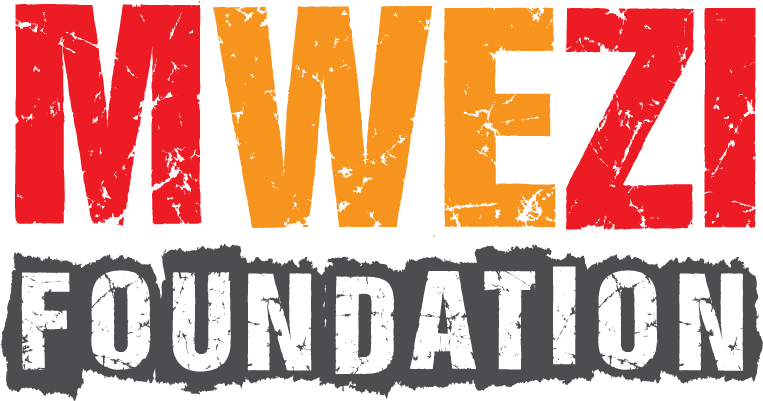
The Mwezi Foundation helps schoolchildren in Kenya achieve their academic potential. We give solar lights to primary schools for them to lend to their top year (known as class 8), which consists of 12-14 year olds.
The solar lights enable the students to do their homework when there is no natural light, which is especially important in the run up to their final exams (known as the KCPE). Mwezi supports schools in rural locations where pupils don’t have any electricity at home, and often no or only intermittent electricity at school. We donate light libraries of 16 solar lights at a time, which the schools then lend onto their students. In addition, we install lighting systems with four bulbs, which can light up one or two rooms.
You can learn about all of the schools that we support here.
![]()
The Mwezi solar light is at the heart of the Mwezi Foundation. The light’s design was developed by us, and refined to ensure that it is easy to take apart and fix. Each solar light costs £16.70 in total: this cost covers the price of components, labour, delivery by one of our schools managers and indefinite maintenance. By donating £16.70, you’ll be transforming a child’s future.



Our lights run on clean, green solar energy, which helps to protect the environment. Independent thinktank, the Ecologic Institute, has estimated that Mwezi solar lights save 517kg of carbon dioxide per light per year.
When our Schools Managers visit our schools, they collect in any broken solar lights. These are then delivered to our workshop, where our Technical Manager, John, fixes them. The repaired lights are then re-donated, thereby limiting waste.
We are absolutely committed to minimum waste. When it is impossible for John to repair a broken light, we use the light’s components to make new solar lights. By re-using and recycling the broken lights in this way, we reduce our waste further.
.



Each Mwezi solar light replaces one kerosene lamp. Kerosene lamps are not only dangerous and bad for the environment; they’re also bad for our health. This is because kerosene exposure is strongly associated with skin disorders and respiratory problems. By replacing the need for kerosene lamps, our solar lights prevent people from developing these health problems.
Our solar lights are assembled and repaired by our Technical Manager, John, in our workshop in Likoni, Kenya. This provides local employment, whilst also reducing the air miles that would be required if we were to transport the lights to another country for repair.
When a child takes their Mwezi solar light home for the night, the whole family benefits. Kerosene lamps are dangerous and can cause fires, whilst solar lights brighten up homes safely.
How it works:
1. Our solar lights are assembled by our Technical Manager, John, in our workshop near Mombasa.
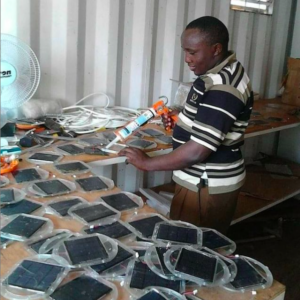
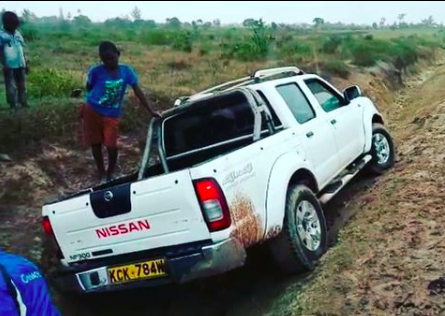
2. Our Schools Managers, Julia and Antony, travel to one of our schools. Sometimes, weather conditions can make travel very difficult. The photo to the left was taken last year, when the car Julia was travelling in got stuck in the mud! Thankfully, some villagers helped get it going again, and Julia still managed to visit three schools that day.
3. The Schools Manager arrives at the school that they are visiting. They greet the teachers and meet the students. Then, they donate some Mwezi solar lights and take away any broken ones which need to be repaired. In the photo to the right, Mr Kennedy from Kikonde Primary School is receiving a light library (which consists of 16 solar lights).
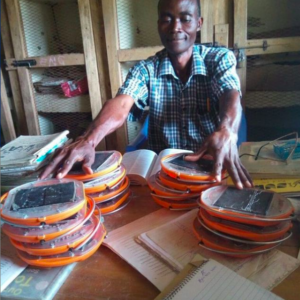
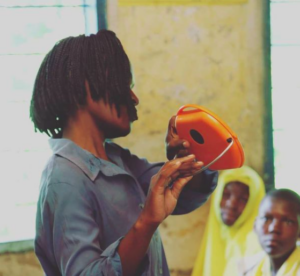
4. The Schools Manager teaches the class how to use (and take care of) their solar lights.
5. Now it’s time to take some group pictures of the class with their new Mwezi lights!
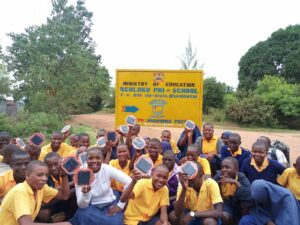
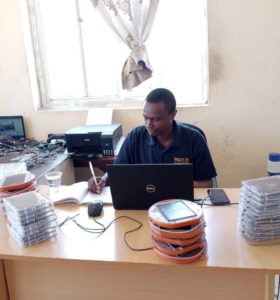
6. After returning to the office, the Schools Managers write a report on the school that they have just visited – noting the number of lights that the school has received, the number of broken lights that were collected in, and the academic performance of the students. They will then share this report with the rest of the team.
7. Finally, the Schools Managers return to our workshop in Likoni to give John the broken lights.
If they can be mended, John will repair them for redistribution. However, if they are unfixable, John will break them down and recycle their components to make new lights.
The fixed lights are then re-donated when Julia or Antony make their next visit to a school.
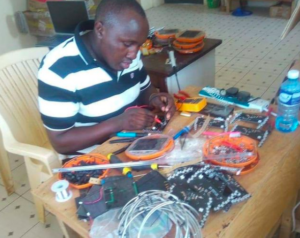

Sustainability
We believe that the Mwezi Foundation is unique. There are lots of solar light providers now – some are very large organisations, whilst many are social enterprises. They buy in cheap lights from China at about £3.50 each and sell them on at cost. They definitely play an important role in providing light to families. However, maintenance is not included. In our experience, in the harsh African conditions, solar panels and lights last up to 2 years. Unless there is a follow up planned, these lights will soon just generate waste.
By maintaining a relationship with the schools, ensuring that lights are shared, paying our staff to visit even if just to collect and replace broken lights, we aim to generate minimum waste and make sure the lights and components are used as efficiently as possible. We donate our lights to our schools and never ask for any payment.
Transparency
None of the Mwezi Foundation’s UK Directors are paid. Instead, our directors volunteer their time and help fund the charity financially. They pay their own expenses on their visits to the schools. We are delighted to have been given a grant to pay a UK fundraiser a very basic wage. Otherwise, all of our salary costs are spent on our Kenyan staff.
